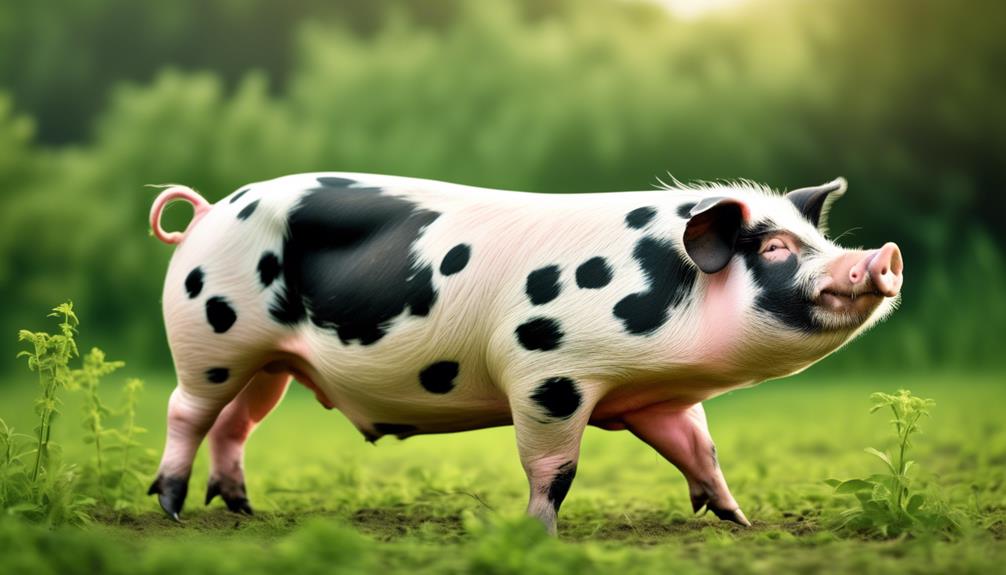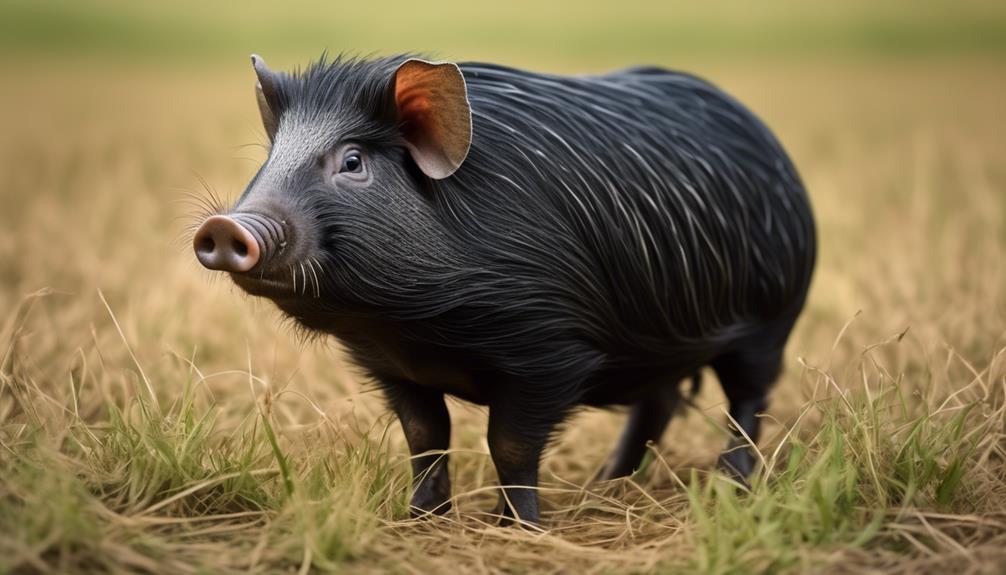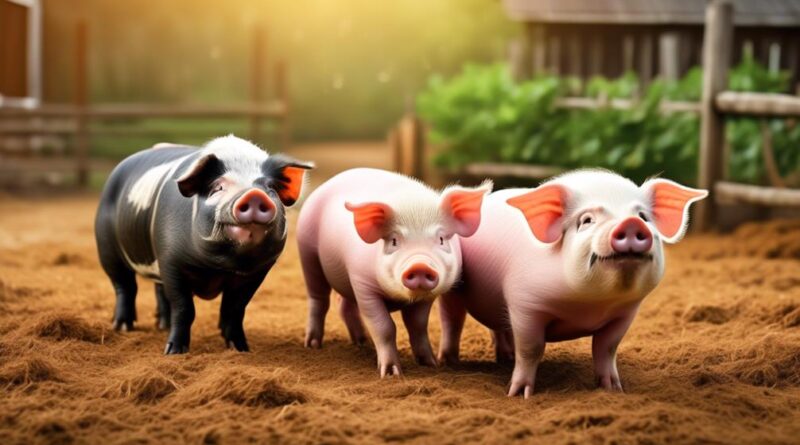Guide to the Friendliest Pet Pig Breeds
You may not be aware, but there are various pig breeds that make excellent and friendly pets. Have you ever considered having a pet pig?
Maybe you've heard that pigs can be great companions, but you're not sure where to start or what breed would suit your lifestyle. Well, you're in luck because we're about to delve into the world of the friendliest pet pig breeds, and you might just find the perfect match for you and your family.
Vietnamese Potbelly
If you're considering a Vietnamese Potbelly pig as a pet, it's important to understand their unique characteristics and care requirements.
Vietnamese Potbelly pigs have specific diet and exercise requirements that are crucial for their health and well-being. When it comes to their diet, it's essential to provide them with a balanced mix of vegetables, fruits, and a limited amount of pellets formulated for mini pigs. It's important to monitor their food intake to prevent obesity, as overfeeding can lead to various health issues.
Additionally, regular exercise is key to keeping Vietnamese Potbelly pigs healthy. Providing ample space for them to move around, along with interactive toys and activities, can help fulfill their exercise needs.
Common health issues for Vietnamese Potbelly pigs include obesity, dental problems, and skin conditions. It's important to monitor their weight and adjust their diet and exercise routine accordingly to prevent obesity. Dental care is also crucial, as their teeth can overgrow, leading to eating difficulties. Regularly checking their skin for any signs of irritation or infestation, and providing appropriate grooming, can help prevent skin issues.
Ensuring regular veterinary check-ups, vaccinations, and parasite prevention are vital aspects of caring for Vietnamese Potbelly pigs. By being attentive to their diet, exercise, and health needs, you can ensure a happy and healthy life for your Vietnamese Potbelly pig.
Juliana
When considering a pet pig breed, Juliana pigs are known for their small size and friendly disposition, making them a popular choice for households seeking a charming and affectionate companion. Juliana pigs typically weigh between 20 to 50 pounds and stand around 10 to 16 inches tall, making them smaller than many other pig breeds. Their small size makes them suitable for indoor living, and their social nature means they thrive on human interaction. Juliana pigs have distinctive coloring, often featuring spots or a mix of colors, and their erect ears and slightly upturned snouts give them an endearing appearance.
In terms of care, Juliana pigs require a similar level of attention to that of a dog. They need a balanced diet of pig pellets, fresh vegetables, and occasional treats, as well as access to fresh water at all times. It's important to ensure they've enough space to move around, both indoors and outdoors, and regular exercise is essential to keep them healthy and happy. Additionally, providing them with enrichment activities like toys or puzzles can prevent boredom and destructive behavior.
When it comes to grooming, regular brushing to remove loose hair and occasional bathing to keep them clean is usually sufficient. It's also essential to trim their hooves regularly and provide them with a comfortable shelter that protects them from extreme temperatures. With proper care and attention, Juliana pigs can make delightful and affectionate pets for those willing to invest the time and effort into their well-being.
Kune Kune
Kune Kune pigs, known for their friendly and docile nature, are a small breed that originated from New Zealand. These pigs are ideal pets for various reasons. Their unique characteristics, such as their small size, docile temperament, and love for human interaction, make them perfect companions for families and individuals alike.
Kune Kune pigs are known for their distinct appearance, including their short legs, upturned snouts, and a coat that can be long and smooth or curly. Their friendly demeanor and sociable nature make them excellent for those seeking a pet pig that enjoys human company and is easy to handle.
Originating from New Zealand, Kune Kune pigs have gained popularity due to their manageable size and gentle disposition. They were traditionally kept by the Maori people and were allowed to roam freely around their villages. In recent years, their popularity as pets has grown significantly in various parts of the world due to their friendly nature and suitability for smaller living spaces.
Their ability to thrive in a domestic environment and their affectionate behavior towards humans have contributed to their rising popularity as pets.
American Mini Pig
The American Mini Pig, also known as the American miniature pig, has gained popularity as a pet due to its small size and amiable nature. These adorable creatures are known for their intelligence and social nature, making them wonderful companions for individuals and families alike.
Having a pet American Mini Pig can bring immense joy and laughter into your home. Their playful antics and affectionate nature will undoubtedly warm your heart, creating a strong bond between you and your furry friend.
Imagine coming home to a wagging tail and oinks of excitement, eagerly awaiting your return. The love and companionship these pigs offer are truly priceless.
When it comes to training tips, consistency and positive reinforcement are key. American Mini Pigs are highly intelligent animals and can be easily trained using treats and praise. Start with basic commands like sit and stay, and gradually introduce more complex tricks. Patience and understanding are crucial during the training process, as these pigs respond best to gentle guidance.
In terms of dietary needs, it's essential to provide a well-balanced diet for your American Mini Pig. A combination of high-quality pig pellets, fresh fruits, and vegetables will ensure they receive the necessary nutrients. Additionally, monitor their food intake to prevent overfeeding, as obesity can lead to health issues. Consulting with a veterinarian for personalized dietary recommendations is always a good practice.
Yucatan

Yucatan offers a unique environment for pet pig owners, with its rich history and diverse cultural influences shaping the landscape and providing a fascinating backdrop for pig enthusiasts. The Yucatan pig, also known as the Mexican hairless pig, is a breed known for its adaptability and friendly temperament, making it an excellent choice for those looking to add a pig to their family.
When it comes to Yucatan pig care, it's important to provide a suitable living environment that offers both shelter from the sun and the occasional cool breeze. This breed is well-suited to a warm climate, but it's essential to ensure they've access to shade and water to prevent overheating. Additionally, regular veterinary check-ups and a balanced diet are crucial for ensuring the health and well-being of your Yucatan pig.
In terms of Yucatan pig temperament, these animals are known for their social nature and intelligence. They thrive on interaction and will form strong bonds with their human family members. Yucatan pigs are generally gentle and affectionate, making them great companions for those willing to invest time and effort into their care and training. They're also known for their playful and curious nature, so providing mental stimulation and enrichment activities is essential to keep them happy and healthy.
Ossabaw Island
Nestled off the coast of Georgia, Ossabaw Island is home to a unique breed of pig with a rich heritage and distinct characteristics. Ossabaw Island pigs, also known as Ossabaw Island hogs, are a critically endangered breed that has been preserved through conservation efforts. These pigs have a fascinating history, having been brought to the island by Spanish explorers in the 16th century.
Here are a couple of things that might tug at your heartstrings when you think about Ossabaw Island pigs:
- Conservation Efforts
Knowing that these pigs are critically endangered may evoke a sense of responsibility for their preservation. It's heartwarming to see dedicated efforts to ensure the survival of this unique breed.
- Pig Island Tours
Imagine the joy of experiencing pig island tours where you can witness these incredible creatures in their natural habitat. The opportunity to observe them roaming freely, displaying their wild pig behavior, is a truly heartening experience.
These pigs are well-adapted to their natural habitat, often foraging for food such as acorns, roots, and small reptiles. Their hardiness and ability to thrive in the wild, despite facing endangerment, make them a symbol of resilience and the importance of conservation efforts. Whether it's learning about their unique diet or witnessing their wild pig behavior, there's something undeniably touching about the Ossabaw Island pigs and the efforts to preserve them.
Guinea Hog

Imagine yourself encountering another critically endangered breed of pig, the Guinea Hog, which, like the Ossabaw Island pigs, carries a significant historical and conservation value. Guinea hogs are known for their excellent breeding capabilities. They've a high fertility rate, often producing large litters with minimal assistance. This makes them an ideal choice for those interested in breeding pigs. However, it's essential to ensure responsible breeding practices to contribute to the conservation of this rare breed.
When it comes to care and maintenance, Guinea hogs don't require extensive grooming. Their short, coarse hair makes them well-suited for various climates, and they're generally hardy animals. As with any pet, regular feeding and access to fresh water are crucial. Additionally, providing adequate shelter and space for them to root and forage is essential for their well-being.
Guinea hogs are known for their docile and friendly nature, making them a suitable choice for those looking for a personable pet pig.
Meishan
Meishan pigs, originating from China, have gained popularity for their unique characteristics and suitability for various farming environments. This breed has a rich history, dating back over 2,000 years in the Meishan region of China. Their distinct appearance, with wrinkled skin and droopy ears, has captivated pig enthusiasts around the world.
- History
- The Meishan pigs were initially bred in the Meishan region of China and were highly regarded for their high-quality meat and excellent mothering abilities. However, they faced near-extinction in the 1980s, leading to conservation efforts to protect and preserve this rare breed.
- Characteristics
- Meishan pigs are known for their gentle and docile nature, making them ideal for first-time pig owners. Their ability to adapt to various climates and their high fertility rate make them a valuable addition to any farm.
When it comes to caring for Meishan pigs, it's important to provide them with a spacious and clean living environment. Regular grooming, including cleaning their skin folds, is essential to prevent any skin issues. Additionally, proper training from a young age can help them become well-behaved and responsive pets.
Meishan pigs thrive on a balanced diet, consisting of high-quality feed and ample access to fresh water. With the right care and training, Meishan pigs can make affectionate and loyal companions for anyone willing to welcome them into their homes.
Frequently Asked Questions
Are There Any Specific Dietary Requirements for These Pet Pig Breeds?
You should consider the nutritional needs and feeding schedule of pet pig breeds. Be aware of any dietary restrictions and the need for special supplements. It's important to maintain a balanced diet for their health and well-being.
What Kind of Living Space or Environment Do These Pet Pig Breeds Thrive In?
In general, pet pig breeds thrive in a spacious living space, whether indoor or outdoor. They typically do well in rural environments with access to outdoor areas, but can also thrive in urban settings with proper care and accommodation.
How Do These Pet Pig Breeds Typically Interact With Other Pets or Children?
Around other pets, friendly pet pig breeds are usually sociable but may need supervision. With children, they often display playful behavior. It's important to introduce them properly to ensure positive interactions and safety for all.
Are There Any Common Health Issues or Concerns Associated With These Pet Pig Breeds?
Common health issues for pet pigs include obesity, joint problems, and skin conditions. Preventative care involves regular vet check-ups, proper diet, and exercise. Consider their dietary needs, living environment, and social interactions for overall well-being.
What Kind of Grooming or Maintenance Is Required for These Pet Pig Breeds?
To care for your pet pig, grooming requirements are minimal. Regular hoof trimming and a quick brush to control shedding are usually all that's needed. Ensure your pig has a spacious, well-ventilated shelter.
Conclusion
So, if you're looking for a friendly pet pig, consider one of these breeds. With the right care and environment, they can make wonderful companions.
Whether you choose a Vietnamese Potbelly, Juliana, Kune Kune, American Mini Pig, Yucatan, Ossabaw Island, Guinea Hog, or Meishan, you'll be sure to find a loving and social addition to your family.
Don't forget to do your research and provide the best possible care for your new piggy friend!
